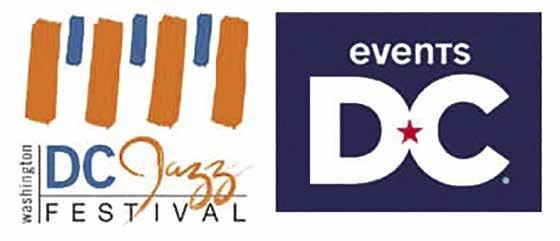
8 minute read
Business
Sunny Sumter Promoted to President/CEO of DC Jazz Festival Organization
WI Staff Report
The DC Jazz Festival® [DCJF] recently announced the promotion of Sunny Sumter to the role of president and chief executive officer for the highly-acclaimed nonprofit organization that celebrates America’s unique art form – jazz – through year-round programs and performances.
Featured artists showcased by DCJF represent the Greater Washington Area, other parts of the U.S. and nations from around the globe.
“We are proud to elevate Sunny to this expanded leadership role for her outstanding work on behalf of the DC Jazz Festival,” said Conrad D. Kenley, Chairman of the DCJF Board of Directors. “She earned this very deserving promotion through her exceptional strategic guidance, management skills and devotion and commitment to promoting jazz in our city and beyond.” In this elevated role, Sumter will oversee the expansion of the annual DC JazzFest, one of the largest annual events of DC’s cultural calendar, direct its yearround educational and community engagement programming and guide the organization’s new strategies and goals. Sumter, a professional jazz vocalist and seasoned arts executive, joined the organization in 2008 and has served as its executive director since 2010, overseeing DCJF’s signature programs including the annual DC JazzFest, the year-round DCJF Education Program and the Charles Fishman Embassy Series. Last year during the COVID-19 pandemic that sidelined so many events across the globe, Sumter led her talented team in producing a highly successful, all-virtual festival that attracted a record-breaking 200,000 music fans from countries that included Brazil, Canada, France, Italy, Japan, Panama and the UK. According to Pollstar’s weekly Live Stream chart, the 2020 DC JazzFest reached the third-highest number of viewers of any live-streamed event in the world during the last week of September 2020. “It’s truly a labor of love to

Homeownership more affordable. M&T has options to help you achieve homeownership. You may be eligible for solutions to help: • Reduce the cash needed at closing • Lower monthly payments • Save thousands by paying less interest • Qualify with a less-than-perfect credit history Get started with one of our mortgage specialists by calling 1-888-253-0993 or visit us at mtb.com. Equal Housing Lender. Certain restrictions apply. Subject to credit and property approval. ©2021 M&T Bank. Member FDIC. NMLS# 381076. 57100 210510 5 Sunny Sumter (Courtesy photo)
work in my hometown to expand the rich, culturally important and impactful art form that is jazz,” said, Sumter, a D.C. native who attended the District’s renowned Duke Ellington School of the Arts and earned her bachelor’s degree in music business with a jazz voice minor from Howard University.
“I look forward to continuing to grow the annual DC JazzFest, one of the District’s cultural destinations, while finding more ways to introduce fans, young and old, to jazz,” she said.
Prior to her tenure at the DC Jazz Festival, Sumter held management/director positions with the Aspen Institute, National Foundation for Teaching Entrepreneurship, the Smithsonian Institution and the Rhythm and Blues Foundation.
The recipient of honors which include the Howard University Benny Golson Award and a DC Commission on the Arts and Humanities Fellowship, she’s also a current fellow with the DeVos Institute of Arts Management and serves on several boards.
For more about the DC Jazz Festival and its programs, visit www. dcjazzfest.org.
WI


JPMorgan Chase Working to Keep Housing Affordable in D.C.
By Stacy M. Brown WI Senior Writer
JPMorgan Chase announced it is making a $400 million nationwide philanthropic commitment to close the housing affordability gap for Black and Latinx households.
The investment is part of the firm’s $30 billion commitment to help advance racial equity and drive an inclusive recovery.
It also continues the banking giant’s commitment locally.
Nearly three years ago, JPMorgan Chase received a visionary idea submitted by a D.C. collaborative which included the Douglass Community Land Trust (Douglass CLT).
The submission helps families in their homes and communities under a proven shared-equity model that develops and preserves permanently affordable housing in neighborhoods over generations.
The submission earned a $5 million, three-year investment, and because of JPMorgan Chase’s initial funding, the Land Trust has now purchased land for 219 units to keep housing affordable in six wards.
“D.C. is so expensive I wasn’t sure I would be able to find somewhere affordable. This opportunity through Douglas Community Land Trust, to own a home and be close to my family - was unlike anything else out there,” homeowner Nery Peña said in an email.
Peña closed on her new home earlier this month.
“I am so happy we were able to take advantage of it,” she said.
“Now, my daughters and I have something that we can call our own. I am the first homeowner in my family, and I plan to live here for the long term and then pass the house down to my daughters.”
Ginger Rumph, Executive Director Douglass Community Land Trust, described the nonprofit as an organization centered around racial and economic equity created to prevent displacement of current and future District residents.
“The organization helps to build wealth for individuals and families while giving residents the ability to make decisions within the community,” Rumph explained.
Fundamentally, Douglass CLT aims to make D.C. an equitable place where everyone can stay and thrive – and specifically low-income, Black and Brown residents.
Those residents have contributed to making D.C. the thriving community it has become but hasn’t benefitted from the economic prosperity in nearly the same proportion as their white counterparts, she noted further.
Rumph also explained the Douglass CLT pay-it-forward concept.
“Douglass Community Land Trust uses a resale formula, built into the Land Lease and outlined in the Permanent Affordability Covenant, to determine the maximum price for which a Douglass CLT property owner can sell their home at a later date,” Rumph added.
She continued:
“This Resale Formula is designed to provide a fair amount of wealth creation for the selling household/ owner while at the same time keeping the home affordable for subsequent buyers/occupants.
“Subsidy initially invested in Douglass CLT properties is retained over time, serving generations of homeowners and occupants without requiring increasing subsidies at each successive sale to keep them affordable. This formula still provides equity growth for the owner without allowing home prices to balloon. Therefore, the home can be made affordable for the next purchaser – what we call ‘Pay-It-Forward.’”
Additionally, the pay-it-forward term is used as part of Douglass CLT’s mission to focus on serving more than one generation.
Dekonti Mends-Cole, Vice President, JPMorgan Chase Mid-Atlantic, Global Philanthropy, said the Douglass CLT is one part of a wider nonprofit collaborative effort that was formed to help prevent resident and small business displacement due to increased gentrification East of the Anacostia – and that the 11th Street Bridge Park project benefits all residents.
The collaborative also includes: Building Bridges Across the River, City First Enterprise, Skyland Workforce Center, and Washington Area Community Investment Fund,
“The collaborative submitted an award entry to the JPMorgan Chase PRO Neighborhoods competition (now AdvancingCities), and its nomination stood out to us because of their ability to work collaboratively to support longstanding D.C. residents,” MendsCole stated.
“Preserving affordable housing is often a challenge when a city gentrifies, which is why the Douglass Community Land Trust is designed to helping long-term, D.C. residents of color have access to quality affordable housing for generations,” Mends-Cole further noted.
She continued:
“This region has seen accelerated regional growth due to an influx of people, public and private capital, but we believe lasting and real growth in the region is dependent on advancing the economic trajectory of low-income residents. A core driver displacing low-income residents is the evaporation of affordable housing, and the District has experienced some the highest levels of resident displacement in the country.”
The community land trust model is one of many interventions actively working to shift the tide of displacement and ensure that all neighbors can benefit from a prosperous region no matter what income level they are.
“A Land Trust is a great way to offer pathways of increasing permanent affordable housing in a city. It’s also an initiative that provides a solution for and by the people who live here, as its success is measured and is dependent on meeting the needs of residents,” Mends-Cole concluded.
“The Land Trust has grown so much since its infancy and is constantly able to acquire new properties and land thanks to funding from JPMorgan Chase and other public and private investors, showing a testament to how much this work is needed and valued.”
JPMorgan Chase’s new $400 million philanthropic commitment includes addressing housing stability, affordability, and wealth creation.
The bank seeks to create more affordable and sustainable homeownership paths.
A new Chase Community Home Lending Advisor will help more people realize their homeownership dreams and engage with industry partners and regulators to find ways to address the gaps in the residential appraisal process.
“We’re trying to address some of the barriers to affordable housing and homeownership to help provide family stability and build generational wealth for Black and Latinx families,” Jamie Dimon, Chairman, and CEO, JPMorgan Chase & Co., said in a news release.
“Whether you rent or own your home, more families deserve fair, sustainable, and accessible options, and businesses have a responsibility to develop housing solutions for those who lack access to opportunity.”







